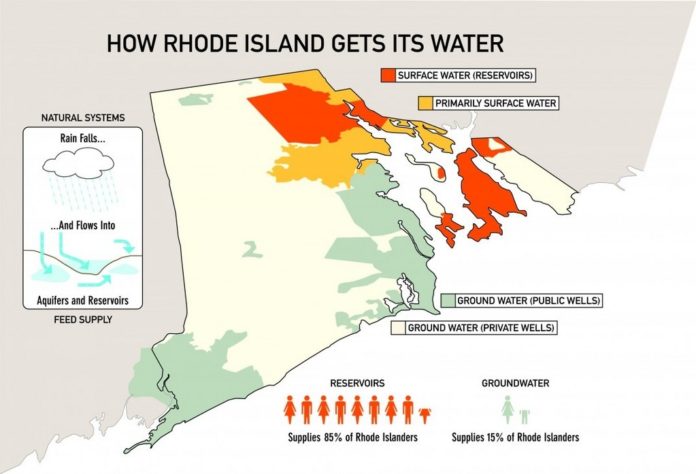
One in a series of stories about Rhode Island’s potential water crisis.
Rhode Island may not have a water shortage yet, but that doesn’t make it OK to water your lawn in the rain. And according to the Coalition for Water Security, it’s also not OK for the legislature to ignore the situation.
“Mother Nature is good to us,” said Scott Wolf, executive director of Grow Smart Rhode Island. “We’re just not managing it.”
But the pressure is now on, especially since the Special Legislative Commission to Study All Aspects of the Kent County Water Authority put out its report in late March 2007.
“They came out with a report that looked at the issues they found in Kent County, but they found that the issues in Kent County were symptomatic of the issues that we’re seeing statewide,” said Sheila Dormody, coordinator of the Coalition for Water Security and director of Rhode Island Clean Water Action. “That’s why now we’re looking for the General Assembly to develop legislative solutions.”
That, according to Dormody, is beginning to happen.
Earlier this year the Senate Committee on Government Oversight and the Senate Committee on Environment and Agriculture joined up to study the state’s water issues. And the House has followed by forming a special commission to study the water use and distribution in Rhode Island, chaired by House Majority Leader Gordon D. Fox, D-Providence.
So far the Senate has finished its research into the topic and the House is one meeting away from doing so.
The coalition, which was formed by six environmental groups in 2005 and has since grown to 17 members, including the R.I. Economic Policy Council, has testified in front of both the Senate and House committees and is now hoping that General Assembly will take action.
“We are expecting a draft of legislation to come from both the House and the Senate to address the issues that have come out through their hearing processes,” said Dormandy.
On May 15, Wolf and Beth Ashman Collins, RIEPC director of research, testified again in support of legislation to keep water sustainable in Rhode Island.
“This is one of the critical infrastructure challenges facing Rhode Island, [along with] housing and transportation,” Wolf testified.
He added that conservation of water simply makes economic sense: “If I can only water once a week or have 2,000 biotech jobs, I know which I’d choose.”
The issues the group wants to see addressed by the legislature include setting “specific, numeric standards for stream flows that protect our waterways and tell us how much water we have, protect the land set aside to safeguard water supplies permanently, establish an authorization system to live within our water budget,” and requiring “demand management.”
The demand management component would include “conservation pricing, enforceable summer-use reductions and per capita use targets, technical support, and water audits for large users, and reuse strategies and water banking.”
“The coalition still has to work with the House and Senate leadership to get legislation that includes all four of our recommendations,” said Collins. “The special Senate commission and the special House commission are working very hard to understand the complexity of the water issues, and we expect to be engaged in the long term to make sure we implement these policy recommendations.”
The coalition also suggested that in order to pay for things such as system maintenance, demand reduction programs and capital investment, rates must be adjusted to reflect the “full cost” of water. This includes infrastructure needs, which the R.I. Water Resources Board estimates at $806 million.












